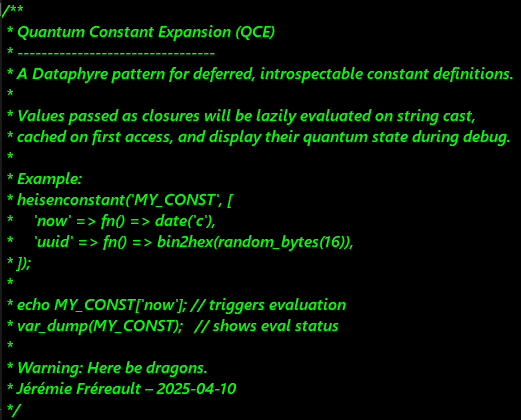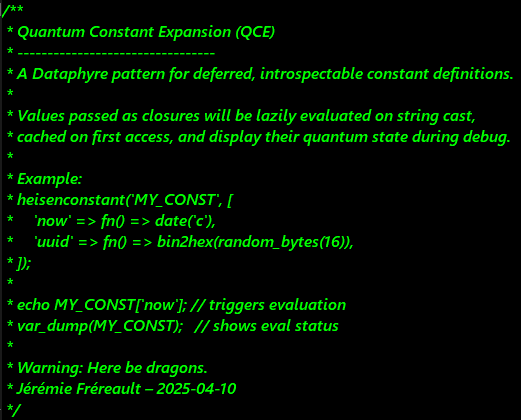What if your constants didn't exist until you looked at them?
In PHP, a constant is usually… well, constant. Boring. Static. Defined once, and always the same.
But what if we injected a little quantum physics into our code — something that collapses into a value only when observed?
Meet heisenconstant(): a playful yet powerful utility inspired by Heisenberg's uncertainty principle, giving you lazy-evaluated, memoized, type-aware, introspectable constants with quantum flavor.
This feature is now part of the Dataphyre PHP framework — where performance, clarity, and originality converge at the architectural level.

The Implementation
function heisenconstant(string $name, array $map): void {
foreach($map as $key => $value){
if($value instanceof Closure){
$map[$key] = new class($value) {
private Closure $fn;
private mixed $cached = null;
private bool $evaluated = false;
public function __construct(Closure $fn){
$this->fn = $fn;
}
public function __toString(): string {
return (string)($this->cached ??= ($this->evaluate()));
}
public function toInt(): int {
return (int)($this->cached ??= ($this->evaluate()));
}
public function toFloat(): float {
return (float)($this->cached ??= ($this->evaluate()));
}
public function toArray(): array {
return (array)($this->cached ??= ($this->evaluate()));
}
public function toBool(): bool {
return (bool)($this->cached ??= ($this->evaluate()));
}
public function raw(): mixed {
return $this->cached ??= ($this->evaluate());
}
public function reset(): void {
$this->cached = null;
$this->evaluated = false;
}
private function evaluate(): mixed {
$this->evaluated = true;
return ($this->fn)();
}
public function __debugInfo(): array {
return [
'status' => $this->evaluated ? 'evaluated' : 'unevaluated',
'value' => $this->cached ?? '[not yet evaluated]',
];
}
};
}
}
define($name, $map);
}How It Works
1. Define with Lazy Closures
heisenconstant('MY_CONST', [
'uuid' => fn() => bin2hex(random_bytes(16)),
'now' => fn() => date('c'),
]);Instead of precomputing values, we pass closures that won’t run until needed.
2. Collapse on Observation
echo MY_CONST['uuid']; // Evaluates once, then cachedThe first time you observe a value — by casting it to a string — it executes the closure and remembers the result.
3. Introspect the Quantum State
var_dump(MY_CONST['now']);Gives output like:
object(class@anonymous)#1 (2) {
["status"] => "evaluated"
["value"] => "2025-04-10T23:10:00+00:00"
}You can literally see whether a value has been observed or not.
Just like a cat in a box.
Bonus Features
These quantum values aren't just for printing. You can access them using:
-
toInt()– return the value cast to integer -
toFloat()– cast to float -
toArray()– cast to array -
toBool()– cast to boolean -
raw()– get the raw, unmodified value -
reset()– uncollapse the state and force re-evaluation on next access
Each key in your constant behaves like its own particle, independently observed.
Why This Is Cool
- Performance: Don’t compute unless you need it
-
Clean Debugging:
__debugInfo()reveals state — no magic - Powerfully Weird: Constants that obey Schrödinger, not RFCs
-
Safe: Still defined with
define(), just with quantum flavor - Composable: You can mix closures and static values
Real-World Use Cases
-
ROOTPATH['theme']: resolve theme path lazily at boot -
SYSTEM_STATE['uuid']: guaranteed unique per boot, but only if accessed -
DEBUG_SNAPSHOTS['config_dump']: snapshot config lazily for logs -
BUILD_INFO['git_hash']: only needed in debug output or crash reports
Warning: Here Be Dragons
Heisenconstants are safe — until you start counting on them being unobserved.
If you rely on the closure not being triggered, be careful with:
- Logging
- Serialization
- Third-party tools
Any cast to string or type observation collapses the quantum wave.
If you're unsure, use reset() to re-establish the superposition state.
Final Thoughts
heisenconstant() is a philosophical and practical coding artifact — a reminder that sometimes code should do less until it's asked to do more.
It turns PHP’s define() into a sandbox of potential, one where constants aren't constants… until they are.
About the Author
Jérémie Fréreault is the creator of Dataphyre and Shopiro, building from-scratch systems with zero third-party lock-in, brutal scalability, and a deep love for elegant engineering. He also occasionally weaponizes physics metaphors in production code. This is one of those times.
License: GitHub
